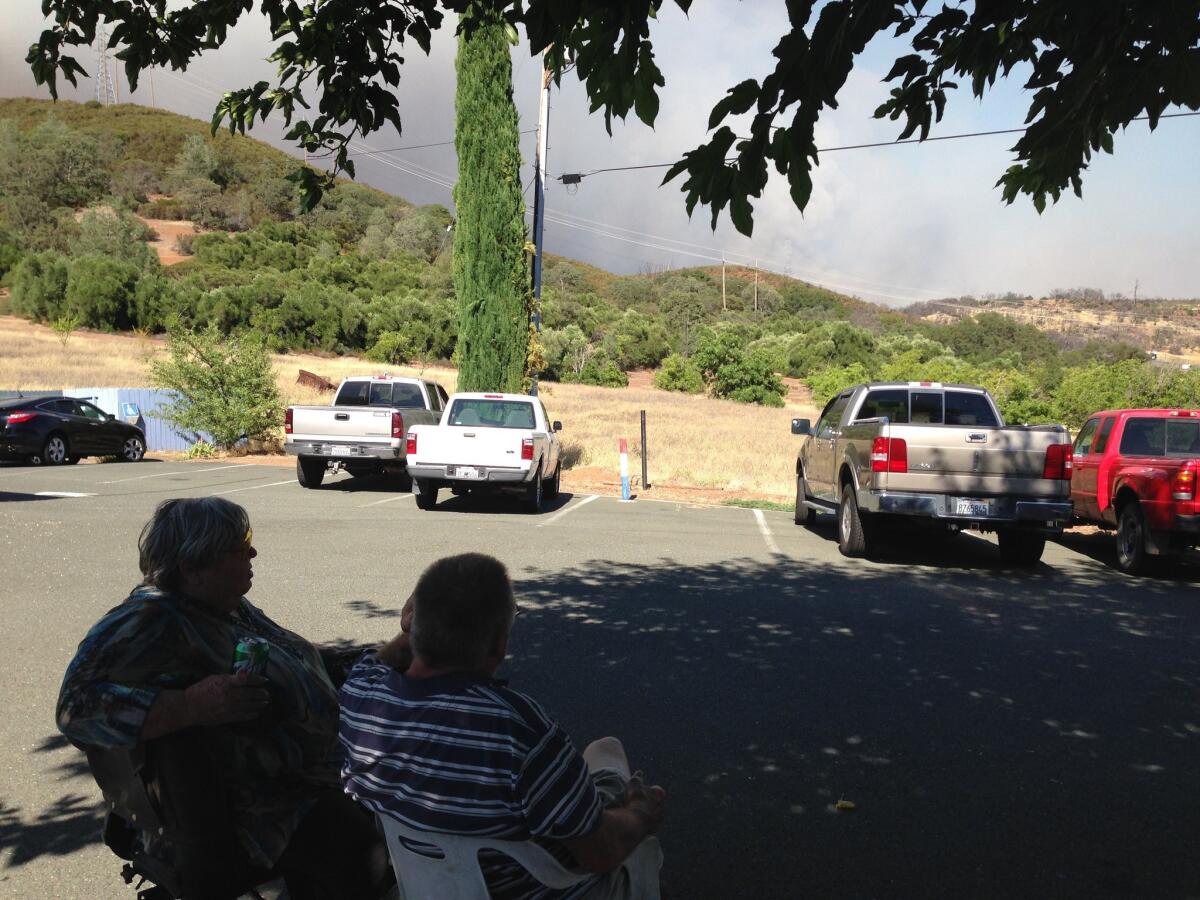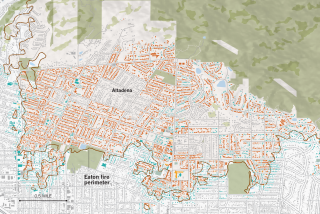Thunderstorms may challenge firefighters battling 65,000-acre Rocky fire

Cheryl and Chris Christian, who live in Clearlake Oaks, Calif., watch the smoke billowing from their neighborhood on Monday afternoon. The Rocky fire has forced thousands of evacuations.
- Share via
Reporting from Clearlake Oaks, Calif. — The unpredictable Rocky fire grew to 65,000 acres by Tuesday morning after bursting through the containment line and jumping a highway, sending embers over firefighters.
After the massive wildfire crossed California 20 on Monday afternoon, firefighters battled multiple new spot fires and worked aggressively to dig out lines around the blaze, according to the California Department of Forestry and Fire Protection.
On Tuesday, there were new challenges for firefighters who had hoped the weather would help control the erratic fire.
Brooke Bingaman, a meteorologist with the National Weather Service in Sacramento, said an incoming storm could bring thunderstorms to the region. That could mean more headaches for firefighters as thunderstorms bring the possibility of lightning and strong winds.
Thousands of lightning strikes sparked several hundred small wildfires since last week, CalFire said.
“Northern California will continue to see the threat of lightning-sparked wildfires as scattered thunderstorms are likely in northwestern and the upper north part of California,” CalFire officials said Monday.
In California, more than 10,000 firefighters are battling 22 wildfires, including the Rocky fire. Cal Fire officials said tinder-dry conditions allowed the wildfires to burn at an explosive rate. Just this year, Cal Fire crews responded to more than 4,200 wildfires, about 1,500 more than the average for the same period last year.
The Rocky fire has defied most models and computer simulations, according to California Department of Forestry and Fire Protection spokeswoman Suzi Brady.
“The fire is burning in a path that hasn’t burned in a long, long time and the vegetation is extremely dry,” she said.
The blaze, which is 12% contained, has already consumed 50 structures, including 24 homes, and 3,100 firefighters have responded to the scene. Feeding on brush and vegetation parched by four years of drought, the wildfire at one point Saturday devoured 20,000 acres in five hours. Even seasoned fire officials appeared to be bewildered.
When it broke out Wednesday near the shore of Clear Lake, about 110 miles northwest of Sacramento, the Rocky fire appeared to be no different from the other blazes being battled across the state.
Its explosive spread is seen as an alarming preview of what could happen in a drought-plagued region. In April, an aerial survey by the U.S. Forest Service estimated that about 5 million trees had died in the Sierra and Sequoia National forests, compared with 300,000 that were counted in the same area last year, according to agency spokesman John Heil.
Currently, more than 9,000 firefighters are dispatched across the state to battle 21 wildfires. The onslaught of wildfires prompted Gov. Jerry Brown to declare a state of emergency last week.
Federal and local officials Monday continued to investigate the death of U.S. Forest Service Fire Capt. David Ruhl, 38, who died while fighting a wildfire in Modoc County. Ruhl, a father of two from South Dakota, vanished Thursday while driving alone to scout the fire, which was burning near the Oregon border.
The cause of the Rocky fire remains under investigation, but thousands of lightning strikes have ignited hundreds of wildfires — many quickly extinguished — since last week, fire officials said. More storms and more lightning are forecast in Northern California through the weekend.
The Rocky fire’s unprecedented growth caught crews off guard. The usual methods of containment — dropping fire retardant, plowing the earth to create break lines and setting backfires to eliminate tinder vegetation in its path — have failed to contain the flames that threaten about 6,300 structures in Colusa, Lake and Yolo counties.
Although no deaths have been reported, residents accustomed to evacuating during wildfires find this experience particularly fearsome.
“The way it moved,” said Kristin Ardell, 40, of Spring Valley, “it was completely different.”
Vicki Estrella, who has lived in the area for 22 years, said that when she and her husband headed to an American Red Cross shelter at Middletown High School, the smell of smoke was thick and she could see flames in the distance.
On Monday, she sat in the driver’s seat of her SUV working a crossword puzzle. She was waiting to hear from her husband, who had gone back to their house to check on their llamas, chickens and cats. She was particularly concerned about the llamas — the oldest one, Cuzco, likes to knock over the water trough so he can roll in the mud. He would need water soon.
Read more about California wildfires >>
Those who gathered at the Moose Lodge — transformed from a venue for bingo and karaoke into an evacuee camp — looked for ways to take their minds off the threat to their homes. Some kept a nervous eye on the nearby roadblock that prevented them from returning to their houses. Inside on the counter, a spiral notebook kept tabs on donations that rolled in throughout the day: $100 cash, 50 pounds of dog food and stacks of bottled water.
Many spent the night in their vehicles parked in front. A few set up tents; others had camping trailers.
Some had gathered in the same place three years ago, seeking refuge from a different wildfire.
Outside the Moose Lodge, Chris and Cheryl Christian found a shady spot under a tree in the parking lot and watched the sky.
The couple evacuated Sunday night, having packed their bags once they learned of the Rocky fire.
“You see that big clump of smoke?” asked Chris Christian, 72, a retired wastewater plant operator. “That looks about where our home is.”
Times staff writer Corina Knoll contributed to this report.
Follow @chrismegerian and @VeronicaRochaLA for more updates from the Rocky fire.
Read the latest Essential California newsletter >>
ALSO:
Manhunt is on for Kern County gunman after days-long rampage
Earthquake: 3.1 quake strikes near Yucca Valley, Calif.
Construction worker dies after bee swarm attack in Riverside
More to Read
Sign up for Essential California
The most important California stories and recommendations in your inbox every morning.
You may occasionally receive promotional content from the Los Angeles Times.











